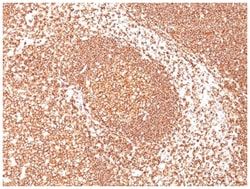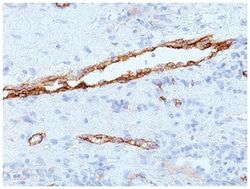TNF-alpha Mouse, Clone: TNF706, Novus Biologicals™
Manufacturer: Fischer Scientific
The price for this product is unavailable. Please request a quote
Antigen
TNF-alpha
Classification
Monoclonal
Conjugate
Unconjugated
Formulation
PBS with 0.05% BSA. with 0.05% Sodium Azide
Gene Alias
APC1 protein, Cachectin, DIF, TNF, monocyte-derived, TNF-a, TNF-alphacachectin, TNFATNF, macrophage-derived, TNFSF2TNF superfamily, member 2, tumor necrosis factor, tumor necrosis factor (TNF superfamily, member 2), tumor necrosis factor alpha, Tumor necrosis factor ligand superfamily member 2, tumor necrosis factor-alpha
Host Species
Mouse
Molecular Weight of Antigen
17 kDa
Quantity
0.2 mg
Research Discipline
Adaptive Immunity, Asthma, Autophagy, Biologically Active Proteins, Cancer, Cytokine Research, Diabetes Research, Immune System Diseases, Immunology, Innate Immunity
Gene ID (Entrez)
7124
Target Species
Human, Mouse, Rat, Canine, Feline, Rabbit, Zebrafish
Form
Purified
Applications
Flow Cytometry, Immunocytochemistry, Immunofluorescence, Immunohistochemistry (Paraffin), Immunohistochemistry (Frozen)
Clone
TNF706
Dilution
Flow Cytometry 0.5-1ug/million cells, Immunocytochemistry/Immunofluorescence 1-2ug/ml, Immunohistochemistry-Paraffin 1-2ug/ml, Immunohistochemistry-Frozen 1-2ug/ml
Gene Accession No.
P01375
Gene Symbols
TNF
Immunogen
Recombinant N-terminal fragment of human TNF-alpha
Purification Method
Protein A purified
Regulatory Status
RUO
Primary or Secondary
Primary
Test Specificity
Tumor Necrosis Factor Alpha (TNF alpha) is a protein secreted by lipopolysaccharide-stimulated macrophages, and causes tumor necrosis when injected into tumor bearing mice. TNF alpha is believed to mediate pathogenic shock and tissue injury associated with endotoxemia. TNF alpha exists as a multimer of two, three, or five non-covalently linked units, but shows a single 17kDa band following SDS PAGE under non-reducing conditions. TNF alpha is closely related to the 25kDa protein Tumor Necrosis Factor beta (lymphotoxin), sharing the same receptors and cellular actions. TNF alpha causes cytolysis of certain transformed cells, being synergistic with interferon gamma in its cytotoxicity. Although it has little effect on many cultured normal human cells, TNF alpha appears to be directly toxic to vascular endothelial cells. Other actions of TNF alpha include stimulating growth of human fibroblasts and other cell lines, activating polymorphonuclear neutrophils and osteoclasts, and induction of interleukin 1, prostaglandin E2 and collagenase production.
Content And Storage
Store at 4C.
Isotype
IgM κ
Description
- TNF-alpha Monoclonal specifically detects TNF-alpha in Human, Mouse, Rat, Canine, Feline, Rabbit, Zebrafish samples
- It is validated for Immunohistochemistry, Immunocytochemistry/Immunofluorescence, Immunohistochemistry-Paraffin.


